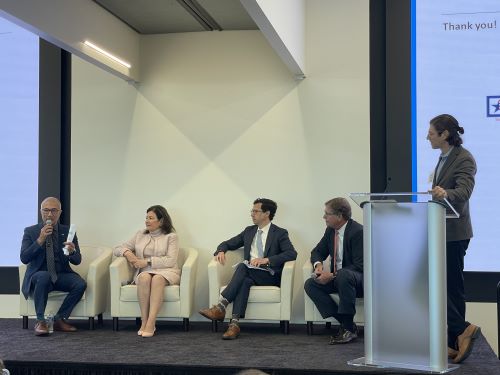The Melting Pot Meets the Voting Booth
"Immigrants’ political and ideological opinions will not shift American policy in a big-government direction."
 An enduring argument against reforming the immigration system is that new immigrants will become a solid voting bloc for the Democratic party and support liberal economic policies. Neither of these assertions is true. New evidence shows that immigrants have, or come to have, about the same political views as long-settled Americans.
An enduring argument against reforming the immigration system is that new immigrants will become a solid voting bloc for the Democratic party and support liberal economic policies. Neither of these assertions is true. New evidence shows that immigrants have, or come to have, about the same political views as long-settled Americans.
In a new paper published by the Cato Institute, we show that immigrants and their descendants are not more supportive of economic policies that favor big government, high taxes, or an increase in the size of the welfare state. Immigrants’ political and ideological opinions will not shift American policy in a big-government direction.
We base our conclusions on results from the General Social Survey (GSS), the largest biennial survey in the United States. Every two years this survey asks tens of thousands of people their opinions about a whole range of issues, from their political and ideological views to how much they trust their neighbors. It also records where they, their parents, and their grandparents were born.
The GSS’s level of detail allows us to track the opinions of immigrants and compare them with those of second- and third-generation respondents. When we compared the opinions of immigrants and their children and grandchildren with those of Americans whose ancestors have been here for at least four generations, we found a remarkable degree of agreement.
When it comes to ideology, on a scale from extremely liberal to extremely conservative, the opinions of first-generation immigrants (i.e. those born abroad) are similar to those of Americans who have been here for at least four generations.
Granted, party identification is different from ideology. Although first-generation immigrants do tend to vote Democratic, that imbalance disappears after a generation: Their children are just about as likely to be Republicans or Democrats as Americans whose families have been here for four generations or more.
Furthermore, while it’s true that immigrants are more likely to say government should do more in our society, overly broad questions like that do not reveal preferences very well. Immigrant opinions on specific government programs like welfare, Social Security, and tax rates are statistically indistinguishable from those of other generations of Americans.
While immigrants and their descendants will not usher in a new period of free-market liberalization, neither will they rally liberal politicians to deliver bigger and bigger government. And conservative Republicans shouldn’t shy away from embracing comprehensive immigration reform because of this unsubstantiated myth.
Associating higher rates of immigration with more liberal economic policies is belied by our history. Legal immigration was largely closed off from the late 1920s (when the restrictions passed in 1924 took effect) to the late 1960s (when those passed in 1965 took effect). Over that period the percentage of the country that was foreign-born dropped from about 12 percent to less than 5 percent, while government spending per person increased 17-fold. Since the end of that period, government spending per person has barely doubled. In this case, government grew the most when immigration was most restricted.
This trend of ideological and political assimilation could change. A harsh, nationwide conservative anti-immigration agenda, similar to the tactic that doomed the California GOP to political oblivion in the early 1990s, could push immigrants and their descendants away from free-market opinions. Blaming immigrants and their families for a whole host of problems will do more to turn them into loyal Democrats or liberals than any ideological predisposition.
American citizens are not radical free-marketeers, nor are immigrants and their descendants big-government ideologues chomping at the bit to increase taxes and expand social-welfare programs. Only if conservatives turn against immigrants, pushing them into the arms of big-government liberals, will immigration lead to more support for a bigger government.








